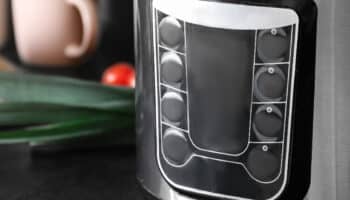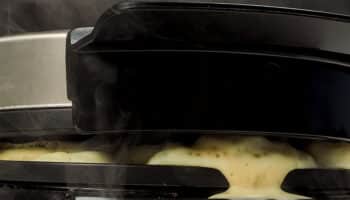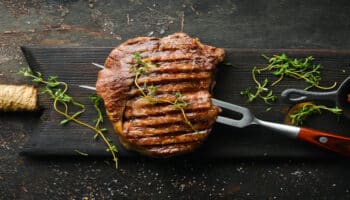We've independently reviewed this article to make sure it's as accurate as we can make it.
To find out more about our article creation and review process, check out our editorial guidelines.
Are you having a hard time comparing cast aluminum vs cast iron?
You’re not alone! It can be tough to tell the differences between them, especially if you’re not familiar with the properties of each material.
Luckily, you’ve come to the right place for answers.
When comparing cast iron vs aluminum, consider your needs. Cast iron is heavier, more durable, and retains heat longer. Cast aluminum, on the other hand, is lighter, more affordable, and heats up faster.
Let’s dig a little deeper into the similarities and differences.
Cast Aluminum vs Cast Iron: 5 Key Differences
Cast aluminum and cast iron are some of the most popular materials used for making cookware. While they look similar, there are key differences between them, such as:
#1 Versatility
One of the main differences between cast iron and cast aluminum cookware is its versatility.
Cast iron is versatile and can withstand high heat, so that it can be used on your stovetop, in your oven, in your oven grill, and even on your BBQ. Cast iron skillets are also the perfect choice for searing meat.
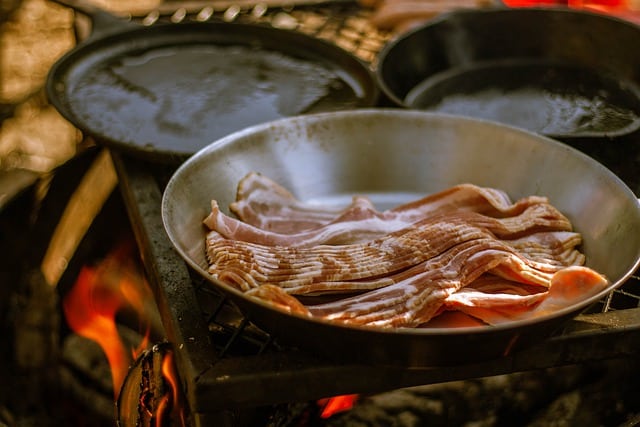
Another plus for cast iron is that it retains its heat. So, if you often find yourself cooking several items simultaneously and struggling to have them all done at the same time, cast iron is the way to go.
If you use your cast iron often, it becomes “seasoned,” meaning it will add flavor to whatever you cook in it.
Cast aluminum, on the other hand, isn’t as versatile as iron. While aluminum conducts heat well, meaning it gets hot fast and easily, it’s lacking when it comes to even heat distribution.
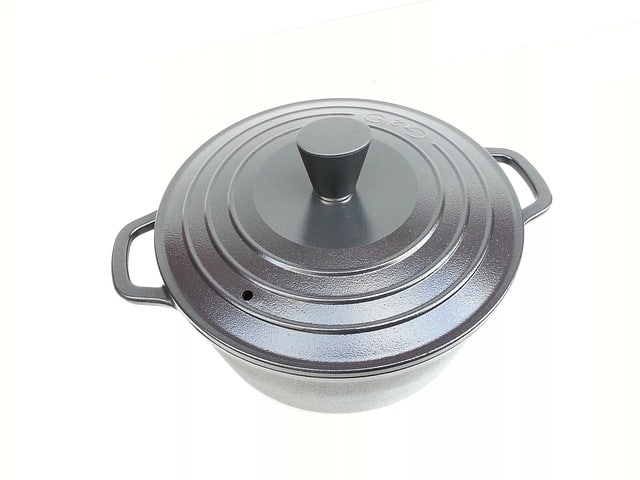
Since it’s a very soft metal, aluminum pans can’t take the beating cast iron can. Your cookware can scratch and dent easily, so caution is needed.
#2 Durability
Now, let’s talk about durability.
Cast iron is more durable than cast aluminum due to its strength and ability to withstand high temperatures without warping or melting.
In fact, I still use my grandparent’s cast iron skillet today, which has passed down through 3 generations and has stood the test of time!
Unfortunately, cast aluminum isn’t as durable as cast iron. It can’t take a lot of wear and tear, so you will need to replace it faster.
#3 Safety
Regarding safety, cast iron and aluminum are generally considered safe. However, there are some concerns about cast aluminum.
From what I’ve seen, aluminum doesn’t react well with acidic foods. The acid can cause the metal to leach into whatever you are cooking. So most cookware will have some sort of nonstick layer, or it will be anodized.
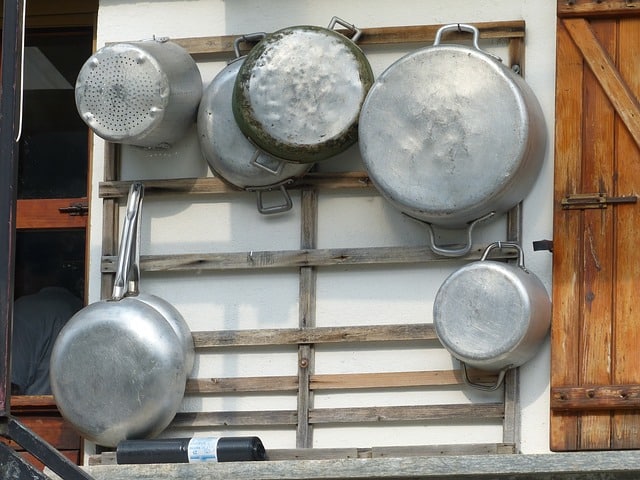
Anodization is an electrochemical process that forms a layer over the naturally occurring aluminum oxide, which happens when aluminum is exposed to the air.
However, even if aluminum is coated with a nonstick layer or anodized, it can still leach a small amount of aluminum content. According to the NCBI (National Center for Biotechnology Information), “Cooking in aluminum utensils often results in statistically significant, but relatively small, increases in aluminum content of food.”
In September 1985, the then-current issue of the Journal of Food Protection estimated that food that had been in contact with either aluminum pots or foil added an average of 3.5 mg of aluminum to the diet. However, most adults are already ingesting 7 to 9 mg of aluminum from food daily, not including the 3.5 mentioned above.
So, is cast aluminum safe?
Cast aluminum is generally safe. Just keep in mind that if you do choose aluminum, anodized is probably your best option, but don’t cook acidic foods in it. And if your pots and pans are damaged, get rid of them.
At the end of the day, the choice is yours. Do whatever you feel comfortable with.
#4 Price
It’s also important to consider the price when choosing between cast aluminum and cast iron.
As you probably imagined, cast iron cookware is typically much more expensive than cast aluminum because of the abovementioned points (durability, versatility, and ability to retain heat).
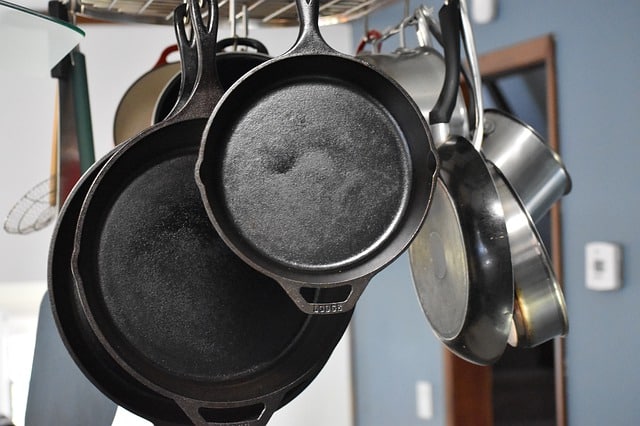
Cast aluminum, on the other hand, is more affordable, as it’s easier to manufacture and lighter.
However, it’s important to consider that although cast iron comes with a higher upfront cost, it can last for generations with proper care and maintenance.
#5 Rust
If you are properly maintaining cast iron or aluminum, neither will rust. Ever.
However, they’ll rust if you aren’t keeping up with maintenance (seasoning).
So if rust is your biggest concern, and you’re the type to follow care instructions, go ahead and choose either iron or aluminum.
FAQs About Cast Aluminum and Cast Iron
To help you choose between cast iron and cast aluminum, I’ve compiled a list of frequently asked questions about them.
What is Seasoning?
When discussing or researching cast iron, you’ll often hear about seasoning, but what does it mean?
Seasoning is a process used to protect your cookware. Follow these steps to season your cast iron cookware:
- First, scrub it well in hot soapy water.
- Dry completely.
- Spread a thin layer of shortening or vegetable oil over the inner surface of your cookware.
- Set your oven to 375 degrees F. Put down a sheet of foil and place your cookware upside down on the middle rack, overtop of it.
- Bake for 1 hour and then let cool.
How to Care for Cast Iron?
Cast iron cookware doesn’t take a lot of effort to maintain. Once it is seasoned—and then seasoned occasionally after that—all you need to do after use is wipe it off with a damp cloth and mild soap because cast iron is naturally nonstick.
How to Care for Cast Aluminum
Like cast iron, you need to season your cast aluminum. The steps are the same as outlined above.
As for cleaning, here are some steps:
- Clean with warm water and mild detergent. Don’t use anything that you wouldn’t use on your skin.
- Don’t leave food residue on them. Clean immediately, as the acidity can degrade the nonstick coating.
- Please don’t put it in the dishwasher.
- If your cookware becomes stained, you can use a mild aluminum cleaner.
- Always refer to the manufacturer’s instructions since coatings can differ and have different cleaning requirements.
And when storing your pots and pans, keep in mind they are somewhat fragile and will scratch and dent. Please don’t force them into your messy, cramped pots and pans cupboard without care.
Is There Anything You Shouldn’t Cook In Cast Iron and Cast Aluminum?
As far as cast iron goes, assuming your cookware is well seasoned, you should be able to cook anything.
Acidic food is strongly discouraged for cast aluminum since it will cause even greater leaching and a nonstick or anodizing process breakdown.
Final Verdict: Cast Iron or Cast Aluminum?
Hopefully, now you know all the differences between cast iron and cast aluminum. So which should you choose?
You should choose cast iron if:
- You are diligent with upkeep and maintenance—meaning seasoning
- The potential health concerns of aluminum freak you out
- You want something that will last at least your lifetime
You should choose aluminum if:
- You’re looking for something lightweight
- You’re on a budget
- You won’t cook acidic foods in it.
Thank you so much for reading. Please check out our other related posts below if you found this article helpful.
Have a great day!






